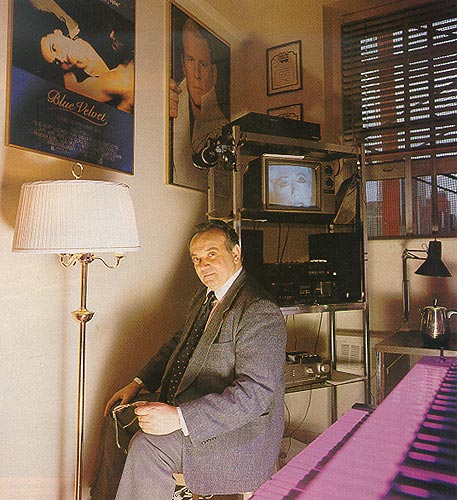
Two-part harmony: Angelo Badalamenti, who also did the score for Blue Velvet, says he and Lynch "Tune in to each other"

Two-part harmony: Angelo Badalamenti, who also did the score for Blue Velvet, says he and Lynch "Tune in to each other"
Composer Badalamenti explains the Love Theme - and lunch
COMPOSER ANGELO BADALAMENTI created most of the ominous music for Twin Peaks in a dim room near Macy's in Manhattan, part of a small, underfurnished apartment he uses as a combination office-studio. Last fall, Badalamenti sat at his electronic keyboards, with director David Lynch coaching from a nearby chair, and in 20 minutes produced the signature theme for the series, the Love Theme from Twin Peaks, as Badalamenti calls it. "You just wrote 75 percent of the score," Lynch said excitedly. "It's the mood of the whole piece. It is Twin Peaks."
The Love Theme, which is heard repeatedly throughout the series, is a short, twisted piece of music, lasting about three minutes. But the sheer speed and ease of its composition indicate what a happy collaboration Badalamenti and Lynch share. It began with Blue Velvet, when Badalamenti was called in to be Isabella Rossellini's vocal coach and ended up writing the whole score. Since then, the two have produced an album of rock music for singer Julee Cruise and an experimental theatrical-musical piece, Industrial Symphony No. 1. Badalamenti is also doing the music for Lynch's new film, Wild at Heart, which will be his 12th movie score and his second for Lynch. "David and I read each other very well in the creative world," Badalamenti says. "We can tune in to each other."
Badalamenti and Lynch often lose themselves in work for hours in the small studio, which is dominated by electronic gear: the keyboards, a small TV, two VCRs, and a stereo system with a double-cassette deck. "I can't begin to tell you what fun we have," says Badalamenti, 52, who commutes to the apartment from his home in exurban New Jersey. Lynch describes the moods or emotions he wants the music to evoke, sometimes even whistling a melodic fragment. Badalamenti begins to play the piano, and Lynch helps to fine tune. During lunch breaks, the duo always order the same food: turkey on whole-wheat toast, with lettuce and tomato, mayo on the side, one order of fries, two cups of coffee. Only on rare occasions - "when we want to pork out," Badalamenti says - will they share an order of bacon fried to extreme crispness, or what Badalamenti calls "cremated."
Because the duo have such a great rapport, Badalamenti knew what to do when Lynch asked him to write something "dark and beautiful" for Twin Peaks. To some ears, the resulting music may sound like something from a soap opera. That similarity is no accident. Says Badalamenti: "David started out with Twin Peaks saying, `This is Blue Velvet gone Peyton Place."'
The soapiness of the Twin Peaks music comes in the middle of the Love Theme, which Badalamenti breaks down into four distinct parts. First comes a ponderous two-note pattern, the Dark Intro, which is an up-and-down drone that creates a tangible sense of doom. Next comes the Climb, a sudsy melody that parades up the scale oh-so-slowly, swelling with melodramatic fervor to the Climax. This orgy of feeling is the sort of thing that used to put viewers in the mood to watch The Edge of Night. Once this musical passion is spent, the melody begins to ebb, in what Badalamenti calls the Falling Part.
Over the tawdry course of Twin Peaks, the Love Theme climaxes at some peculiar moments: at the discovery of a corpse; when a mother learns of her daughter's death. The emotion of the music at these moments doesn't match the emotion of the visual. Lynch and Badalamenti intended these sharp contrasts between what the viewer sees and what the viewer hears to act as a dialectic. As with Blue Velvet, Twin Peaks is about the difference between superficial appearances and the truth behind them. The music is intended to reinforce the notion that all is not what it seems.
At other times, the music has a more direct purpose. Each of the scenes dominated by the young males in the cast is accompanied by what Badalamenti calls Cool Jazz. The exaggerated macho hipness of these characters is accentuated by finger-popping, cocktail-lounge electric piano, pulsing bass, and lightly brushed percussion.
Badalamenti rightfully claims that the music of Twin Peaks sounds like nothing else on TV. On a simplistic level, the effect is somber, banal, depressing. Even when the soundtrack segues into a normally upbeat style, such as a ragtime, the music retains a dark quality. Badalamenti says he can't help it: "Even when I try to write very happy or very sad, it turns out bittersweet." And a perfect match to the complex moral world of David Lynch.
-Ron Givens
Copyright 1990 Entertainment Weekly
Back to the Twin Peaks articles page.